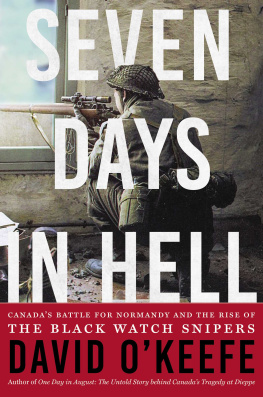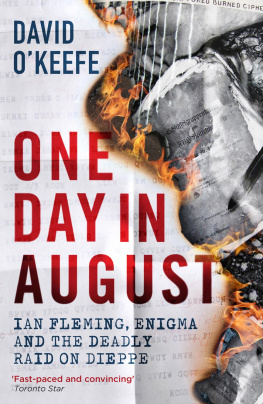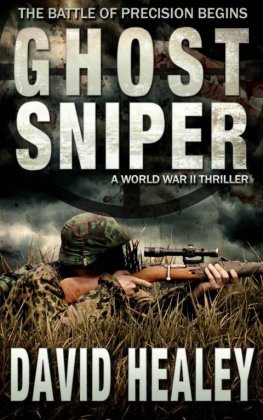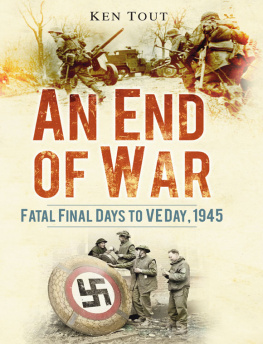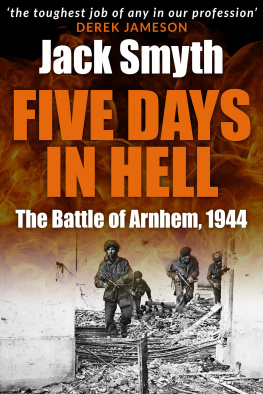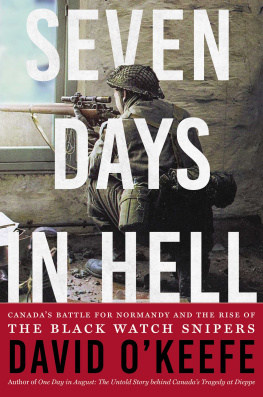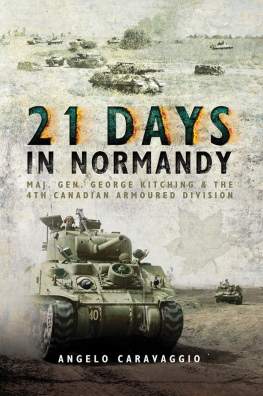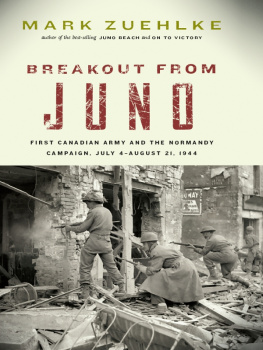David OKeefe - Seven Days in Hell: Canadas Battle for Normandy and the Rise of the Black Watch Snipers
Here you can read online David OKeefe - Seven Days in Hell: Canadas Battle for Normandy and the Rise of the Black Watch Snipers full text of the book (entire story) in english for free. Download pdf and epub, get meaning, cover and reviews about this ebook. year: 2019, publisher: HarperCollins Canada, genre: Detective and thriller. Description of the work, (preface) as well as reviews are available. Best literature library LitArk.com created for fans of good reading and offers a wide selection of genres:
Romance novel
Science fiction
Adventure
Detective
Science
History
Home and family
Prose
Art
Politics
Computer
Non-fiction
Religion
Business
Children
Humor
Choose a favorite category and find really read worthwhile books. Enjoy immersion in the world of imagination, feel the emotions of the characters or learn something new for yourself, make an fascinating discovery.
- Book:Seven Days in Hell: Canadas Battle for Normandy and the Rise of the Black Watch Snipers
- Author:
- Publisher:HarperCollins Canada
- Genre:
- Year:2019
- Rating:3 / 5
- Favourites:Add to favourites
- Your mark:
- 60
- 1
- 2
- 3
- 4
- 5
Seven Days in Hell: Canadas Battle for Normandy and the Rise of the Black Watch Snipers: summary, description and annotation
We offer to read an annotation, description, summary or preface (depends on what the author of the book "Seven Days in Hell: Canadas Battle for Normandy and the Rise of the Black Watch Snipers" wrote himself). If you haven't found the necessary information about the book — write in the comments, we will try to find it.
David OKeefe: author's other books
Who wrote Seven Days in Hell: Canadas Battle for Normandy and the Rise of the Black Watch Snipers? Find out the surname, the name of the author of the book and a list of all author's works by series.
Seven Days in Hell: Canadas Battle for Normandy and the Rise of the Black Watch Snipers — read online for free the complete book (whole text) full work
Below is the text of the book, divided by pages. System saving the place of the last page read, allows you to conveniently read the book "Seven Days in Hell: Canadas Battle for Normandy and the Rise of the Black Watch Snipers" online for free, without having to search again every time where you left off. Put a bookmark, and you can go to the page where you finished reading at any time.
Font size:
Interval:
Bookmark:
Contents
One Day in August: The Untold Story behind Canadas Tragedy at Dieppe
Seven Days in Hell
Copyright 2019 by David OKeefe.
All rights reserved under International and Pan-American Copyright Conventions. By payment of the required fees, you have been granted the nonexclusive, nontransferable right to access and read the text of this e-book on-screen. No part of this text may be reproduced, transmitted, downloaded, decompiled, reverse-engineered, or stored in or introduced into any information storage and retrieval system, in any form or by any means, whether electronic or mechanical, now known or hereafter invented, without the express written permission of HarperCollins e-books.
Published by HarperCollins Publishers Ltd
Cover image created and released by the Imperial War Museums.
Colour retouching by Marina Amaral (https://marinamaral.com)
Map by Mike Bechthold (mbechthold@wlu.ca)
FIRST EDITION
EPub Edition: October 2019 EPub ISBN: 978-1-4434-5478-0
Version 09282019
Print ISBN: 978-1-4434-5477-3
HarperCollins Publishers Ltd
Bay Adelaide Centre, East Tower
22 Adelaide Street West, 41st Floor
Toronto, Ontario, Canada
M5H 4E3
www.harpercollins.ca
Library and Archives Canada Cataloguing in Publication information is available upon request.
LSC / H 9 8 7 6 5 4 3 2 1
For those who no longer speak
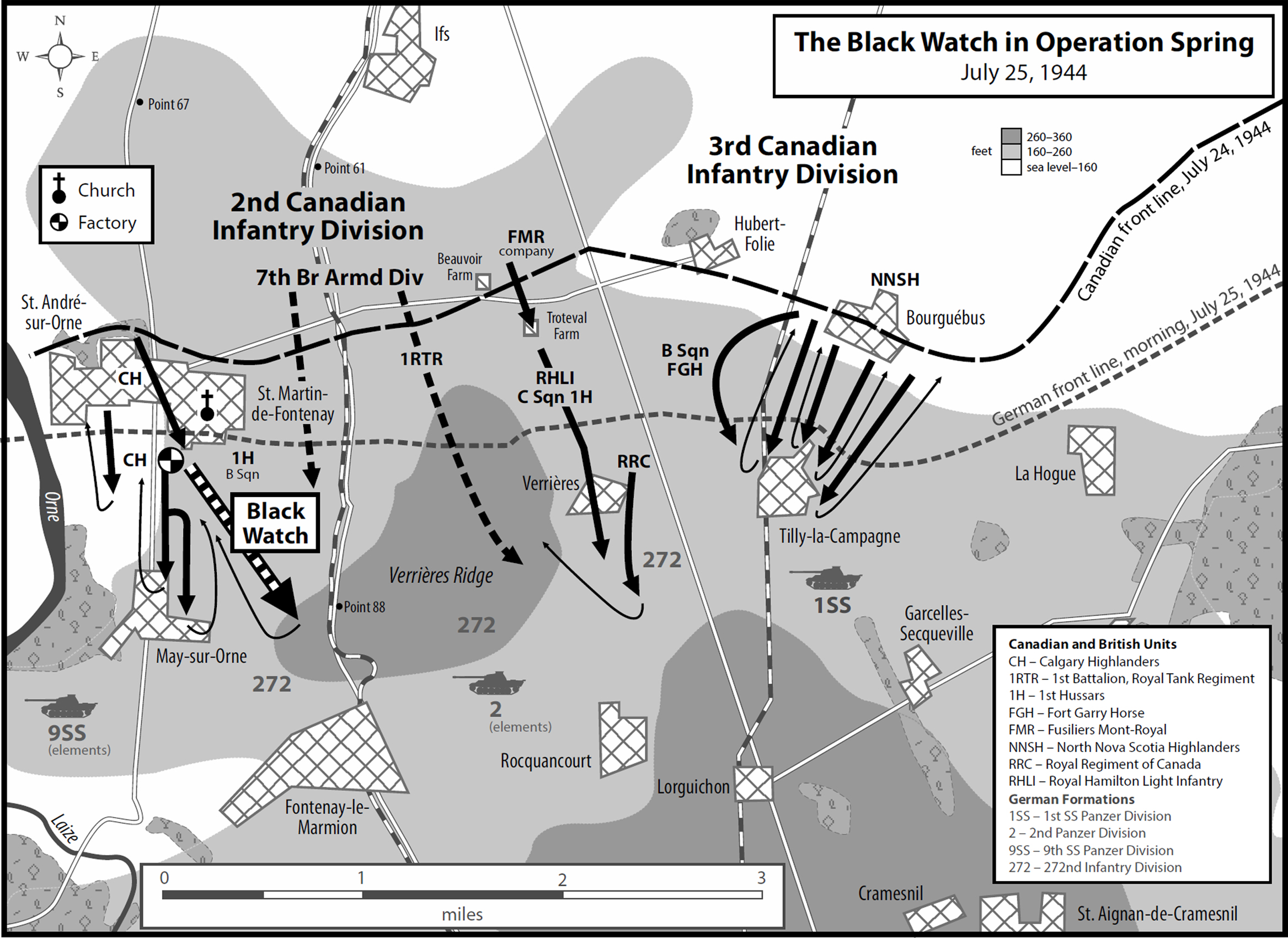
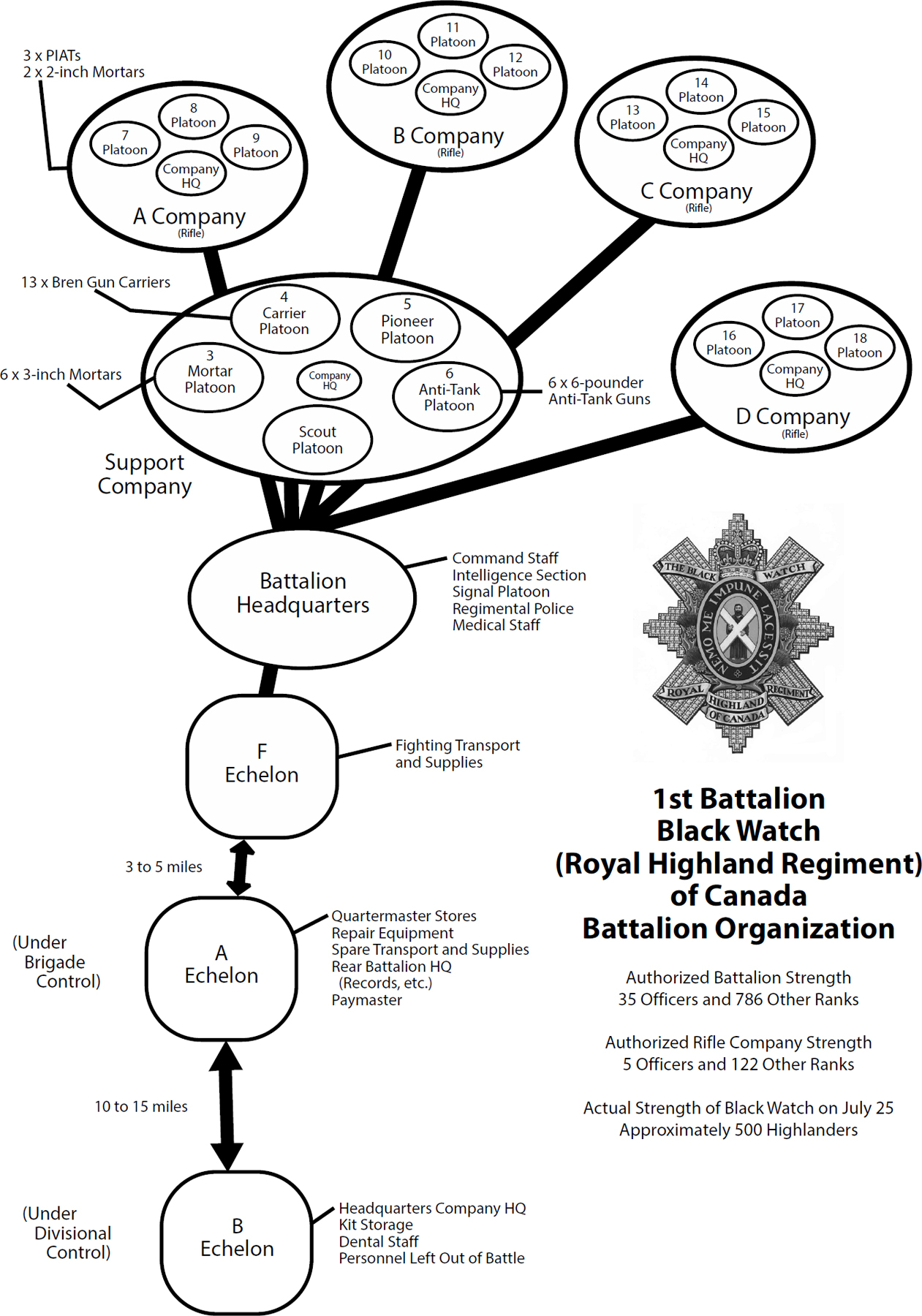
W HEN I FIRST WALKED THROUGH THE DOORS OF the Castle on Bleury Street, the Black Watch armoury in the heart of Montreal, in the late winter of 1991, I had no idea where my journey would lead. At that time, the first Gulf War had just erupted, and I had decided that the time had come to follow in the footsteps of my grandfather, my father, uncles, great-uncles and cousins who had served during both World Wars, Korea and the First Gulf War, a service to the country that would extend into Bosnia and Afghanistan.
My tenure as a young subaltern with the Black Watch was both brief and thoroughly undistinguished, and I left the uniform after two years to pursue my passion for military history. Over the next two decades, I maintained my association with the Department of National Defence, working as a researcher with the Directorate of History and Heritage before returning to the Black Watch, where I served as regimental historian. During that period, I penned a series of academic articles concerning the experiences of the 1st Battalion in 194445 and interviewed (formally and otherwise) most of the men quoted directly in this work. Many of those men went on to be lifelong friends, and as a fan of military history, I stood in awe of their courage and fortitude, but as a historian, I remained professionally distanced and detached, objective, questioning and critical. I made this distinction clear upfront and told them I was sworn to tell it as the evidence portrayed it, rather than simply as they saw it. To a man, they respected that caveat, and they responded openly and honestlysometimes, as you will read in the pages, painfully so.
Sadly, all of these men are now gone, as the ravages of time wait for no man. For whatever reason, the snipers in the battalions scout platoon enjoyed greater longevity than their brethren in the rifle companies, and as such, their story began to dominate the Black Watch narrative, leading one rifleman to quip, Bloody scouts think they won the damn war! Indeed, the scouts were, as Corporal Jimmy Hook Wilkinson recalled, the eyes and ears of the battalion, and over time they had developed a distinct sense of themselves, in part due to their longevity, in part their unique, almost bohemian role in the battalion, but more importantly, the fact that they had come through the bloodbath on Verrires Ridge in that half-forgotten summer of 1944 and lived to tell their tales.
Memory, of course, is a fickle beast, and I have relied on their recollections primarily for tone and atmosphere, or to convey impressions or express their intensely personal experiences or inner thoughts. Any claims of fact that have an impact upon the overall narrative, I have cross-referenced with the archival record to verify historical accuracy and reduce the degree of bias associated with any historical venture.
To avoid a flood of repetitive references, all the direct quotations (unless otherwise noted) have come from these conversations. Some of these men, as you will notice, were enlightened, eloquent and highly educated; others, not so much. But all of them opened up in a straightforward fashion and entrusted with me their emotive recollections, which in some cases they had withheld from families or friends, awaiting the proper context for their unveiling.
I have also employed the narrative style; as a professor of history, I have taught in classrooms, on battlefields, on television and in monograph and journal form, and have not found any other vehicle that can deliver a multitude of complex, interlaced, nuanced and layered concepts in a simple (but never simplistic) fashion. In this respect, I have dared invoke the spirit of Cornelius Ryan and Stephen Ambrose, whose oral history tradition has thrilled and captivated millions over the last five decades, though I have anchored my work in a deep and thorough corpus of research whose scope remains both broad and deep, and provides evidence that organically shocks, amazes, electrifies and magnetizes the public conscience. What has evolved in this work, and has been the main constant throughout my career in history, is that truth is, indeed, stranger than fiction.
My view on military history falls in line with that of the pre-eminent military thinker and historian Sir Basil Liddell-Hart, who believed that military history should never fall into the realm of the sentimental treasure, where our understanding and engagement are limited to an annual polishing of our national historical trophies. Ideally, history should, through the engagement of unsettling facts, teach us about those hard-earned experiences so that we may develop an understanding and, above all, empathy for those who went before us. This is the main focus of the book.
As such, themes of heroism, courage, determination, resilience and friendship walk hand in hand with cowardice, frailty, chaos and horror throughout the following narrative. I have made a point of not sugar-coating what befell these men in July 1944. Telling their story in an unvarnished fashion was the only option, given their openness and honesty; the only way to justly honour their memory.
With that said, on the one hand, I stand in awe of what these men endured, and they have my undying respect; on the other, I do not wish for one second to see my children bear what they had to. After all, if we cannot learn and draw from historyparticularly military historythen what is the point?
Perhaps the first word in this work should go to Hook Wilkinson, who for decades was a stalwart at every Black Watch regimental function, from parades to battlefield pilgrimages, funerals, mess dinners and veteran association gatherings. Over that time, his stories poured forthsome true, some embellished and oft-repeated, leading most to politely chalk up his claim as the best shot in the regiment to visions of glory distorted by time. Im sure you were, Jimmy or Wow, thats great, Jim tended to be the polite yet all too patronizing response to his boast.
Then, in 2015, while filming the documentary
Next pageFont size:
Interval:
Bookmark:
Similar books «Seven Days in Hell: Canadas Battle for Normandy and the Rise of the Black Watch Snipers»
Look at similar books to Seven Days in Hell: Canadas Battle for Normandy and the Rise of the Black Watch Snipers. We have selected literature similar in name and meaning in the hope of providing readers with more options to find new, interesting, not yet read works.
Discussion, reviews of the book Seven Days in Hell: Canadas Battle for Normandy and the Rise of the Black Watch Snipers and just readers' own opinions. Leave your comments, write what you think about the work, its meaning or the main characters. Specify what exactly you liked and what you didn't like, and why you think so.

